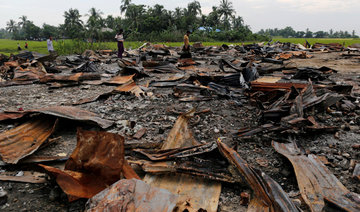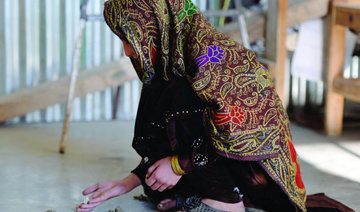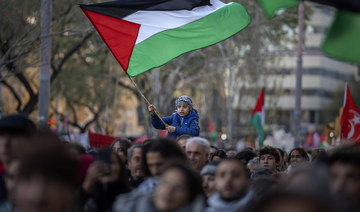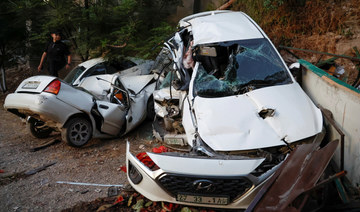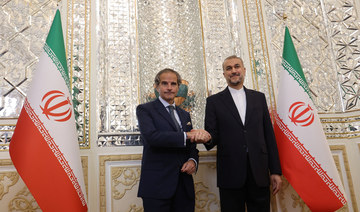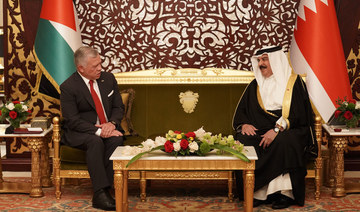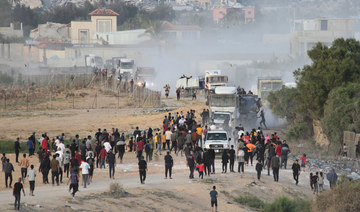CAIRO: Nada Mohammed has been married for nearly two years and has two children. But there is no official record of her marriage, or of her children’s birth.
This is because Nada was married at just 15, three years under the age of legal marriage in her home country, Egypt. Going to school is compulsory in the country between the ages of six and 15.
Nada had not finished school and now never will. She is still only 16.
“My parents believe it is more important for me to be married and settled in my husband’s house than for me to have an education,” says Nada, who is from a small village near the city of Tanta, 120 km north of Cairo. As a girl, she had no right to object, she adds.
Her husband is 18 and works in construction. Before marrying Nada, he was made to sign a document declaring he owes her father a large sum of money. This is to deter him from deserting Nada, giving her some level or security, or money for her and her family if he does leave.
It was deemed necessary to do this as with no official marriage record when a bride is under age, there can be no comeback if her husband walks out before she is 18, or if he tries to blackmail her family by threatening to expose them for giving him false information about her age.
Further, as Nada’s marriage cannot be registered until she is 18, the birth of her one-year-old child and newborn cannot be registered either. Even when she is legally able to register her marriage, it could be difficult to register her children as it would expose her under-age marriage. And so her relatives have bribed registry officials to falsify Nada’s age on documents.
“Relatives and friends have intervened to help my family register my children in the civil registry until I am 18 years old and the marriage is documented,” she said.
Despite child marriage being illegal in Egypt, unfortunately it is still not uncommon. The Egyptian constitution states: “Any person under the age of 18 is considered a child.”
The law on under-age marriage is clear: “A marriage contract may not be registered for a person who has not attained the age of 18.”
Egypt is a signatory to the African Union’s Charter on the Rights and Welfare of the Child, which outlaws marriage to anyone under 18.
But even though it contravenes domestic and international law, marrying a minor is not a criminal offense in Egypt and so it continues to happen on a large scale.
According to a 2017 census by the Central Agency for Public Mobilization and Statistics, 118,904 girls in Egypt were under 18 when they wed and 18,127 — 15 percent — were under 16.
The Ministry of Health says that 500,000 children are born every year to underage mothers.
In 2006, the International Population Council in Egypt interviewed girls and women who married young. It was found that 62 percent of the girls who married young did so because their parents had forced them to get married.
There is no sign of a change in the number of child marriages since then, and the driving factors now and then are the same: Poverty — marrying off a daughter means one less mouth to feed — and the fear of losing social status. A girl who loses her virginity before her wedding shames her whole family. The fear is that the longer a girl remains unwed, the higher the chance that she will have her purity compromised.
According to Dr. Iqbal Samalouti, formerly dean of the High Academy for Social Services, a branch of the Higher Education Ministry, 36 percent of the marriages in impoverished rural Egypt involved under 16s, and 16 to 20 percent of all babies born in the Arab world were born to adolescent mothers.
Since marrying a minor is not a recognized crime punishable by law, it is treated as fraud.
Legal experts say the bride’s father and the person officiating at such weddings should be fined and the marriage annulled.
They also demand that the law should clearly state that minors in the marriage are not at fault.
Mohamed Hamed Al-Gamal, a former judge, wants the offense of forcing or facilitating child marriage should carry a jail sentence of seven years to life as a deterrent.
“The marriage of minors is a big problem for the girl and for society as it leads to an increase in the number of births and the consequent crises in society,” he said.
In an official editorial, lawyer Amr Abdel Salam, deputy head of Al-Haq International Human Rights Organization, said the police should be proactive in pursuing offenders.
“A crime has been committed and that is a matter of national security,” he said.
In a speech last October, following the publication of the annual census, President Abdel Fattah El-Sisi admitted he was shocked by the figures on the numbers of girls married at age 12.
“At this young age, we are putting too much responsibility on their shoulders,” said the president.
“How can a girl get married at 12? There are widows and divorcees who are 12 years old. We are cruel to our children.”
Nada, still a child in the eyes of the law, was allowed no say in her own marriage. But that does not mean she has no opinion on it.
“Early marriage before the legal age is not in the interest of any girl,” she says. “My advice is that girls should wait until they reach legal age so that they can take responsibility for the family and their children.”
Despite child marriage being illegal in Egypt, it is still all too common
Despite child marriage being illegal in Egypt, it is still all too common
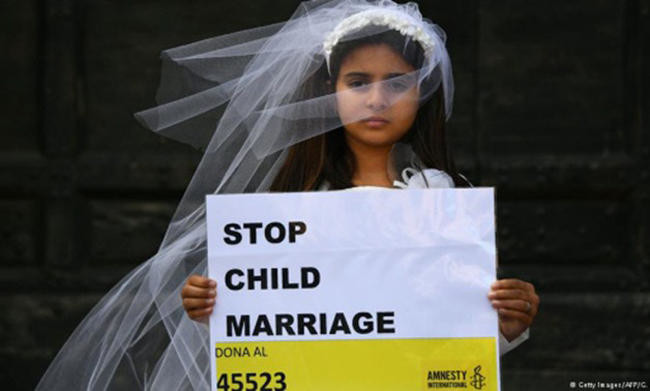
Joy in Palestinian refugee camp in Beirut as European trio advances cause
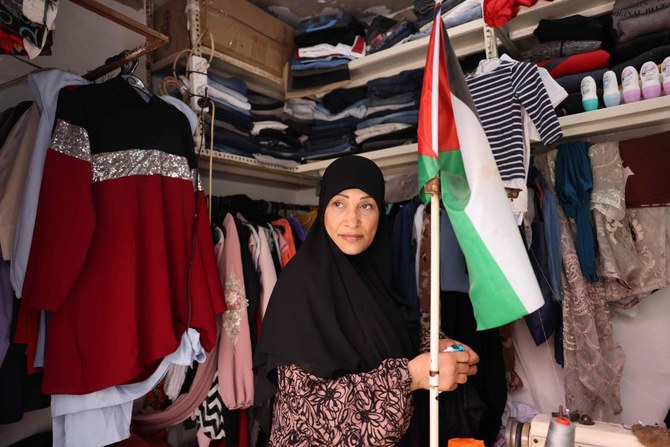
- “We hope that the whole world will recognize Palestine, and we are happy with this decision... It is a beautiful feeling,” said Alaa Ghozlan
- Israel was enraged by the move announced Wednesday by Ireland, Norway and Spain, arguing that it amounts to “rewarding terrorism”
SHATILA, Lebanon: In Beirut’s impoverished Palestinian refugee camp of Shatila — a maze of alleyways where posters honor fallen martyrs — residents expressed joy Wednesday after three European countries said they would recognize a Palestinian state.
“We hope that the whole world will recognize Palestine, and we are happy with this decision... It is a beautiful feeling,” said Alaa Ghozlan, 26, whose family is originally from Haifa, now in northern Israel.
“We now have hope to return to our country — a country I was not born in and was deprived of but which lives inside me despite everything,” he told AFP on a winding street in the camp.
Israel was enraged by the move announced Wednesday by Ireland, Norway and Spain, arguing that it amounts to “rewarding terrorism” after Palestinian militant group Hamas launched its unprecedented October 7 attack on Israel that sparked the bloodiest ever Gaza war.
Seven other European countries including Sweden have already recognized Palestinian statehood.
Lebanon hosts an estimated 250,000 Palestinian refugees, many living in poverty in the country’s 12 official camps, according to the United Nations agency for Palestinian refugees (UNRWA).
Most are descendants of survivors of what Palestinians call the Nakba — the “catastrophe” — when about 760,000 Palestinians fled or were forced from their homes by the 1948 war over Israel’s creation.
Shatila resident Samah Omari, 50, a housewife, said she was “very happy” with the decision, and expressed hope that it would eventually impact her and her family.
“People are dying in Palestine. We demand our rights and defend our land so that our state can be recognized by all countries,” she said.
“We hope to return to our country and not be refugees anymore,” she added.
The camp’s tumbledown walls are adorned with Palestinian flags and posters in support of militant groups including Hamas and their leaders.
Men on motorbikes and tuk-tuks squeeze past women shopping and schoolchildren making their way through the streets.
Above, matted electricity wires and plastic water tubes are bound precariously with rope or cables, some weighed down by clothes that have fallen from washing lines.
The United States and most Western European nations have said they are willing to one day recognize Palestinian statehood, but not before agreement is reached on thorny issues like final borders and the status of Jerusalem.
But Israel’s war against Hamas militants in Gaza, with its mounting death toll, has given the issue new impetus.
Suliman Abdel Hadi, 70, an official at the camp, said the timing of the decision was “important after October 7 because of the massacres carried out by the brutal Zionist enemy.”
“We see a bright future for the Palestinian cause,” said Abdel Hadi, whose family is from the Acre area, now in northern Israel.
“What happened today is the result of sacrifices made by the Palestinian people over 76 years of persecution, killing and destruction,” he added.
Hamas’s October 7 attack resulted in the deaths of more than 1,170 people, mostly civilians, according to an AFP tally of Israeli official figures.
Militants also took 252 hostages, 124 of whom remain in Gaza, including 37 the army says are dead.
Israel’s retaliatory offensive has killed at least 35,709 people in Gaza, most of them civilians, according to the Hamas-run territory’s health ministry.
On another street in Shatila, a man who gave his name as Abu Majdi, and whose father originally hailed from Haifa, called the decision “great” and said it was “baptised in the blood of martyrs.”
“This recognition will change the future of coming generations and the future of the Palestinian cause,” said the 63-year-old man, a Palestine pendant hanging from his neck.
Israel allows return to three evacuated West Bank settlements
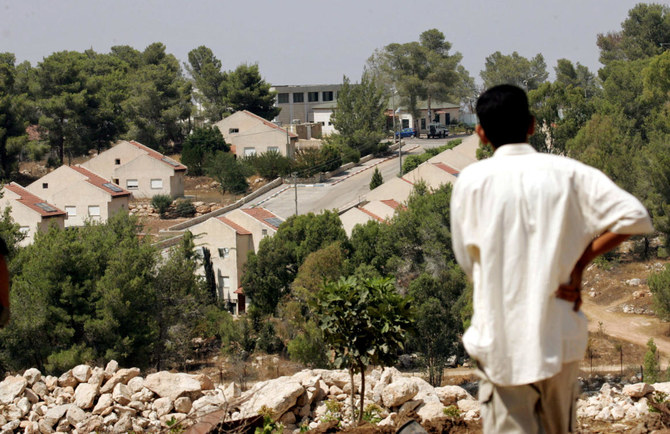
- The military announced the move on the day three European states said they would formally recognize the State of Palestine
- A fourth settlement, Homesh, was cleared for entry last year
JERUSALEM: The Israeli military has approved permission for Israelis to return to three former West Bank settlements they had been banned from entering since an evacuation ordered in 2005, the defense ministry said on Wednesday.
The three settlements, Sa-nur, Ganim and Kadim, are located near the Palestinian cities of Jenin and Nablus, both of which are strongholds of armed militant groups in the northern West Bank.
A fourth settlement, Homesh, was cleared for entry last year after parliament passed an amendment to the so-called “disengagement law” of 2005. Permission from the military, which has overall control of the West Bank, was required for any return to the other three former settlements.
The military announced the move on the day three European states said they would formally recognize the State of Palestine, and as Israel’s military offensive against the Palestinian militant group Hamas continued in the Gaza Strip.
It took the decision despite international pressure on Israel to curb settlement expansion in the West Bank, which Palestinians want as the core of a future independent state alongside Gaza.
“The Jewish hold on Judea and Samaria guarantees security, the application of the law to cancel disengagement will lead to the development of settlement and provide security to residents of the area,” Defense Minister Yoav Gallant said in a statement, using the Biblical names for the West Bank that are often used in Israel.
There was no immediate comment from the Palestinian Authority.
Last year’s amendment to the disengagement law was seen as opening the way to re-establishing former West Bank settlements evacuated in 2005 under a plan overseen by former Prime Minister Ariel Sharon.
Under the plan, which was opposed by the settler movement at the time, all 21 Israeli settlements in Gaza were ordered to be evacuated. Most settlements in the West Bank were unaffected apart from the four that will now be accessible again.
More than 500,000 Jewish settlers are now estimated to be living in the West Bank, part of territory captured by Israel in the 1967 Middle East war, with a further 200,000 living in East Jerusalem.
For Palestinians and most of the international community, the settlements are considered illegal. Israel disputes this, citing the Jewish people’s historical, biblical and political links to the area as well as security considerations.
Despite international opposition, settlements have continued to expand strongly under successive Israeli governments.
Death of Iran’s president has delayed talks with UN nuclear watchdog, Grossi says
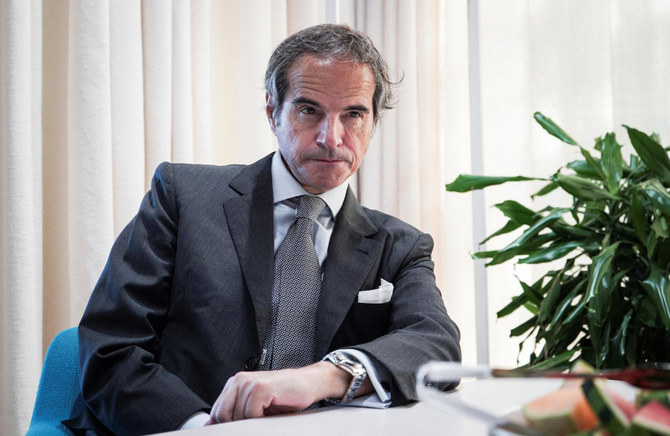
- The International Atomic Energy Agency faces a range of challenges in Iran
- Nuclear watchdog has been trying to expand its oversight of Iran’s atomic activities
HELSINKI: The deaths of Iran’s president and foreign minister in a helicopter crash have caused a pause in the UN nuclear watchdog’s talks with Tehran over improving cooperation with the agency, the watchdog’s chief Rafael Grossi told Reuters on Wednesday.
“They are in a mourning period which I need to respect,” International Atomic Energy Agency (IAEA) chief Grossi said in Helsinki, where he spoke at a nuclear conference.
“But once this is over, we are going to be engaging again,” he said, describing it as a “temporary interruption that I hope will be over in a matter of days.”
Grossi said the IAEA was planning to continue technical discussions with Iran but they had not yet taken place due to last weekend’s helicopter crash that killed President Ebrahim Raisi and Foreign Minister Hossein Amirabdollahian.
The IAEA faces a range of challenges in Iran, from Tehran’s recent barring of many of the most experienced uranium-enrichment experts on its inspection team to Iran’s continued failure to explain uranium traces found at undeclared sites despite a years-long IAEA investigation.
The IAEA has been trying to expand its oversight of Iran’s atomic activities while the country’s uranium-enrichment program continues to advance. Iran is enriching uranium to up to 60 percent purity, close to the 90 percent of weapons-grade, which no other country has done without developing nuclear weapons.
Tehran says its aims are entirely peaceful.
Iran currently has about 140 kg of uranium enriched to up to 60 percent, Grossi said. According to an IAEA definition, that is theoretically enough, if enriched further, for three nuclear bombs. The IAEA’s last quarterly report in February said Iran had 121.5 kg, enough for two bombs.
Iran is still producing about nine kg a month of uranium enriched to up to 60 percent, Grossi said. It is also enriching to lower levels at which it has enough material for potentially more bombs.
Grossi, who two weeks ago said he wanted to start to see concrete results on improved cooperation from Iran soon, repeated that hope but said a more wide-ranging deal would require “a bit more time.”
For now, his team had not made progress on the main issues, he said.
“It is high time there is some concrete issuance and if not resolution, some clarification of what is this,” Grossi said of the uranium traces at undeclared sites.
“And I would say, confidence in many parts of the world (in Iran on the nuclear issue) is growing thinner.
Bahrain’s king to visit Russia and China
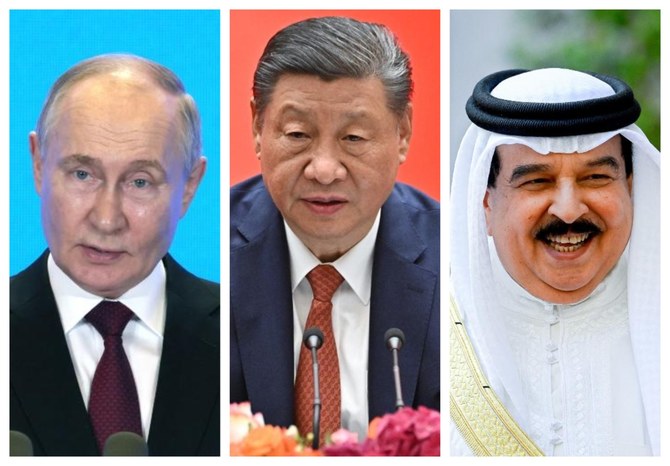
DUBAI: Bahrain’s King Hamad bin Isa Al-Khalifa is visiting the Russian capital, Moscow, on Wednesday at the invitation of President Vladimir Putin, state news agency BNA reported on Wednesday.
The two leaders will discuss cooperation between their respective countries, regional and international developments, and the results of the 33rd Arab Summit, hosted last week in Bahrain.
The king will likewise visit China at the invitation of President Xi Jinping to participate in the opening session of the Arab-Chinese Cooperation Forum.
The two will discuss cooperation between Bahrain and China, as well as the outcome of the 33rd Arab Summit.
Far-right Israeli Cabinet minister visits contested Jerusalem holy site, raising tensions
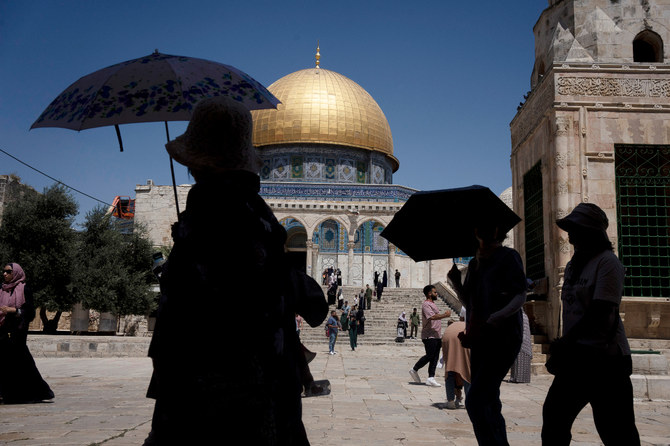
- The visit was a response to a move by three European countries to unilaterally recognize an independent Palestinian state
TEL AVIV, Israel: Israel’s far right national security minister, Itamar Ben Gvir, visited Jerusalem’s Al Aqsa Mosque compound on Wednesday, declaring the contested holy site belongs “only to the state of Israel.”
Ben-Gvir said Wednesday’s visit was a response to a move by three European countries to unilaterally recognize an independent Palestinian state.
“We will not even allow a statement about a Palestinian state,” he said.
The hilltop compound is revered by Jews and Muslims, and the conflicting claims have led to numerous rounds of violence in the past.
Israel allows Jews to visit the compound, but not to pray there. But the visit is likely to be seen around the world as a provocation.
Norway, Ireland and Spain said Wednesday they are recognizing a Palestinian state in a historic move that drew condemnation from Israel and jubilation from the Palestinians. Israel immediately ordered back its ambassadors from Norway and Ireland.
The formal recognition will be made on May 28. The development is a step toward a long-held Palestinian aspiration that came against the backdrop of international outrage over the civilian death toll and humanitarian crisis in the Gaza Strip following Israel’s offensive there.
It was a lightning cascade of announcements. First was Norway, whose Prime Minister Jonas Gahr Støre said “there cannot be peace in the Middle East if there is no recognition.”
“By recognizing a Palestinian state, Norway supports the Arab peace plan,” he said and added that the Scandinavian country will “regard Palestine as an independent state with all the rights and obligations that entails.”
Several European Union countries have in the past weeks indicated that they plan to make the recognition, arguing a two-state solution is essential for lasting peace in the region. The decision may generate momentum for the recognition of a Palestinian state by other EU countries and could spur further steps at the United Nations, deepening Israel’s isolation.
Norway, which is not a member of the EU but mirror its moves, has been an ardent supporter of a two-state solution between Israel and the Palestinians.
“The terror has been committed by Hamas and militant groups who are not supporters of a two-state solution and the state of Israel,” the Norwegian government leader said. “Palestine has a fundamental right to an independent state.”
Since the unprecedented attack by Hamas-led militants on Israel on Oct. 7, Israeli forces have led assaults on the northern and southern edges of the Gaza Strip in May, causing a new exodus of hundreds of thousands of people, and sharply restricted the flow of aid, raising the risk of famine.
Wednesday’s announcements come more than 30 years after the first Oslo agreement was signed in 1993. Since then, “the Palestinians have taken important steps toward a two-state solution,” the Norwegian government said.
It added that the World Bank determined that a Palestinian state had met key criteria to function as a state in 2011, that national institutions have been built up to provide the population with important services.
“The war in Gaza and the constant expansion of illegal settlements in the West Bank still mean that the situation in Palestine is more difficult than it has been in decades,” it said.
In making his announcement, Irish Prime Minister Simon Harris said the move was coordinated with Spain and Norway — and that it was a “historic and important day for Ireland and for Palestine.” He said it was intended to help move the Israeli-Palestinian conflict to resolution through a two-state solution.
Harris said he thinks other countries will join Norway, Spain and Ireland in recognizing a Palestinian state “in the weeks ahead.”
Spanish Prime Minister Pedro Sánchez, Spain’s Socialist leader since 2018, made the expected announcement to the nation’s Parliament on Wednesday. He had spent months touring European and Middle Eastern countries to garner support for the recognition, as well as for a possible ceasefire in Gaza. He has said several times that he was committed to the move.
“We know that this initiative won’t bring back the past and the lives lost in Palestine, but we believe that it will give the Palestinians two things that are very important for their present and their future: dignity and hope,” Sánchez said.
“This recognition is not against anyone, it is not against the Israeli people,” Sánchez added, while acknowledging that it will most likely cause diplomatic tensions with Israel. “It is an act in favor of peace, justice and moral consistency.”
Sánchez argued that the move is needed to support the viability of a two-state solution that he said “is in serious danger” with the war in Gaza.
“I have spent weeks and months speaking with leaders inside and outside of the region and if one thing is clear is that Prime Minister (Benjamin) Netanyahu does not have a project of peace for Palestine, even if the fight against the terrorist group Hamas is legitimate,” the Spanish leader said.
Earlier this month, Spain’s Foreign Minister José Albares said he had informed US Secretary of State Antony Blinken of his government’s intention to recognize a Palestinian state.
Hugh Lovatt, a senior policy fellow at the European Council on Foreign Relations, said “recognition is a tangible step toward a viable political track leading to Palestinian self-determination.”
But in order for it to have an impact, he said, it must come with “tangible steps to counter Israel’s annexation and settlement of Palestinian territory – such as banning settlement products and financial services.”
Israel’s Foreign Minister Israel Katz ordered Israel’s ambassadors from Ireland and Norway to immediately return to Israel. He spoke before Spain’s announcement.
“Ireland and Norway intend to send a message today to the Palestinians and the whole world: terrorism pays,” Katz said.
He said that the recognition could impede efforts to return Israel’s hostages being held in Gaza and makes a ceasefire less likely by “rewarding the jihadists of Hamas and Iran.” He also threatened to recall Israel’s ambassador to Spain if the country takes a similar position.
Regarding the Israeli decision to recall its ambassador in Oslo, Gahr Støre said “we will take note of that. This is a government with which we have many disagreements. What we agree on is to condemn Hamas’s cruel attack on Oct. 7.”
Palestinian President Mahmoud Abbas, speaking after Norway’s announcement, welcomed the move and called on other countries to follow.
In a statement carried by the official Wafa news agency, Abbas said Norway’s decision will enshrine “the Palestinian people’s right to self-determination” and support efforts to bring about a two-state solution with Israel.
Some 140 countries have already recognized a Palestinian state — more than two-thirds of United Nations members — but none of the major Western powers has done so. This move could put more pressure continental heavyweights France and Germany to reconsider their position.
The United States and Britain, among others, have backed the idea of an independent Palestinian state existing alongside Israel as a solution to the Middle East’s most intractable conflict. They insist, however, that Palestinian independence should come as part of a negotiated settlement.
The head of the Arab League called the step taken by the trio of European nations as “a courageous step.”
“I salute and thank the three countries for this step that puts them on the right side of history in this conflict,” Arab League Secretary-General Ahmed Aboul-Gheit wrote on the social media platform X.
Turkiye also applauded the decision, calling it an important step toward the restoration of the “usurped rights of the Palestinians.”
The Turkish Foreign Ministry also said the move would help “Palestine gain the status it deserves in the international community.”




